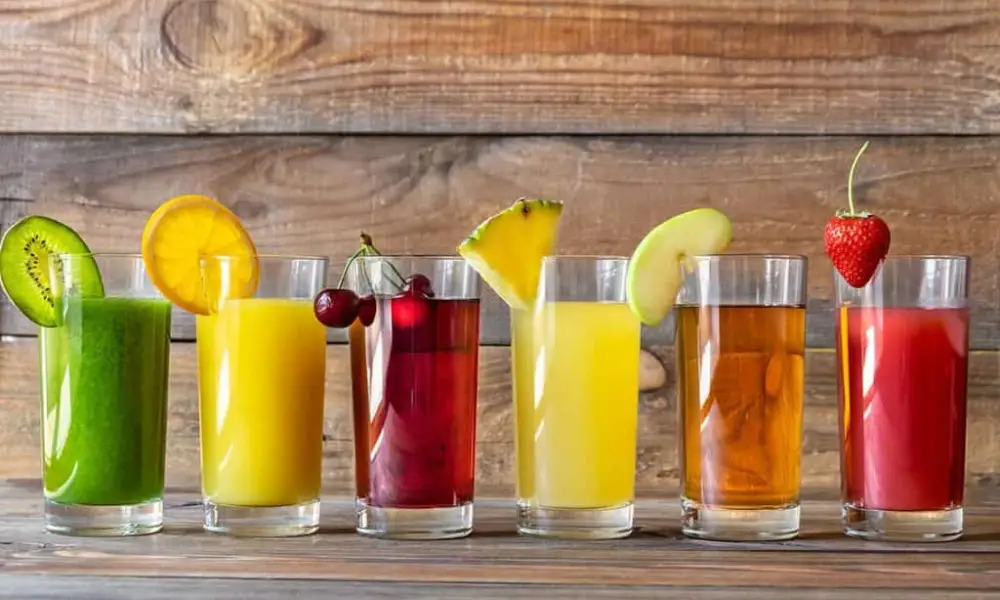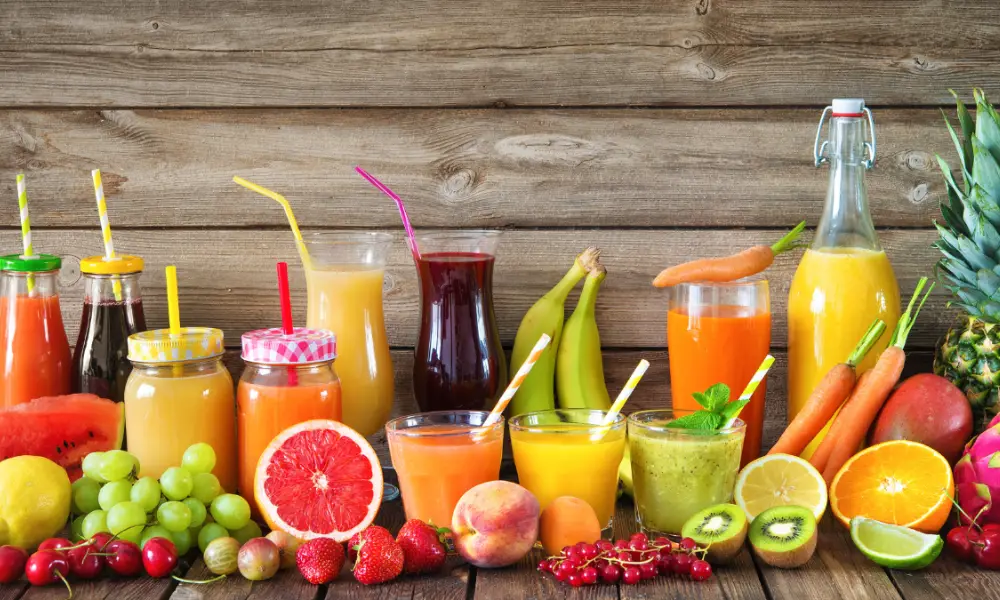Fresh juices and fruit have different shelf-life – the sooner you buy them, the better! However, some important factors will affect the quality of juices and fruit, including the type of storage you use. Fresher fruit and vegetables contain more nutrients than older ones. In addition, as fruits and vegetable age, their bad bacteria increase, making them prone to spoilage. To minimize the growth of these bacteria, wash your fruits and vegetables well before storing them. Also, try to limit the opening and closing of your refrigerator.

How Long Does Fresh Juice Last in the Fridge
The time that fresh juice may be kept typically depends on the type of juicer used and the storage techniques. Drink the juice within 24 hours of finishing the juicing process. It preserves its nutrients and has the finest flavor up to that point.
The juice can always be stored in the refrigerator if you make more juice than you intended. The juice will keep for up to 72 hours in that situation. Remember that the juice won’t be as fresh as it was at first.
For instance, since both side-by-side and French door refrigerators have adequate storage space, you can select between them to store your juice. However, you must consume your fresh juice within 72 hours of storing it in the refrigerator.
This is because fresh juice is packed with vitamins, minerals, and other essential components. Fresh juice alone contains all these chemicals; juice kept in storage for several days does not.
How Long Does Fresh Juice Take to Lose All of its Nutrients?
Within 30 minutes of being squeezed, fresh juice will begin to lose some of its nutrients. Because of this, I have always suggested that you consume the juice immediately after making it.
You might be confused if lime juice can grow rancid in the case of lime juice. Even though it includes citric acid, it might not rot right away, but with time, it will develop an unpleasant taste or odor and, of course, lose all of its nutritional value.
For a better understanding, try to picture how your fruit, such as pineapple, will begin to turn brown after being chopped and left in that position for a while. This is nearly often the case with fruits and vegetables. Therefore, it is not a good idea to leave them exposed.
Reference: Use of high-intensity ultrasound and UV-C light to inactivate some microorganisms in fruit juices
Is it Okay to Juice a Day in Advance?
You can prepare fresh juice a day in advance if you do not have the time to do so daily. As I’ve already indicated, you may store the juice in the refrigerator for up to 72 hours before drinking it.
The juice will start losing some nutrients before you drink it, which is the main drawback to juicing a day in advance. You can always carefully preserve it to ensure you get the most out of it before you drink it.
If you prepare fresh juice ahead of time, you should have it first thing in the morning and on an empty stomach rather than later in the day. This will enable you to consume a significant amount of healthy carbohydrates for your body and your stomach.
Does the Type of Fruit Affect How Long the Fresh Juice Lasts?
All freshly squeezed juices generally degrade at the same rate. Juices from various varieties of fruits are not significantly different from one another. Juice from a store and fresh juice will likely have the most differences.
The difference between these two is in the content; store-bought juice frequently contains a lot of preservatives. These factors extend its shelf life to a few months, but you should still check the expiration date to ensure it is safe to consume.
You receive a 100% natural drink without additives or preservatives when you produce fresh juice at home. This juice form has much more health benefits than store-bought juices; disregard the longevity and always choose something natural.
Pineapple juice from premium brands is my fave. Both are delicious and will increase your love of juice. You can also try some of the best aloe vera juices if you want something more unique.
How Can Fresh Juice be Preserved Longer?
I’ve said it before, but if you want to extend the shelf life of your fresh juice, correct storage is essential. I’ll share some of my favorite, incredibly simple, and practical storage methods if you don’t know how to store them properly. Let’s begin with them.
Glass Containers Should be Airtight.
It would help if you always looked for glass containers to put fresh juice in rather than plastic ones. The chemicals and dangerous substances frequently present in plastic are the main cause.
Juice kept in a plastic container will surely become contaminated with these chemicals, making it unfit for consumption. Additionally, the juice’s acidic characteristics might cause leaks in plastic containers.
Use a glass container to store your juice so that nothing can happen to it. This kind of container can be used with great safety; be sure you close it tightly to prevent oxidation.
Fill Containers
When freezing fresh juice, you should always allow room in the container because frozen juice occasionally expands somewhat.
However, you should fill the container to the top if you intend to keep the juice in the refrigerator.
By doing this, you ensure that the container is completely airtight. The juice will stay as fresh as possible if the glass jar is filled. This will also reduce the chance of oxidation.
Store Immediately after Making The Juice
Juice should be stored and placed in the refrigerator as soon as possible if it won’t be consumed. I’ve said that keeping juice out in the open is like leaving fresh fruit out in the open; both will quickly begin to spoil.
Get a glass container with a secure lid and store the juice once you’re done juicing. You can always return to it and consume it!
Juice Must be Properly Frozen!
Juice can be frozen to extend its shelf life; however, it will significantly reduce its nutritional content. As I’ve already suggested, it might be better to freeze it as ice cubes rather than in bottles or jars.
The Container is Vacuum Sealed
Although many people are not accustomed to vacuuming sealing containers, this is a very effective technique for preserving the juice for longer.
What Kind Of Juicer Is Best For Making Fresh Juice?
Many people are unaware of the fact that the type of juicer you use can have a significant impact on the quality of your fresh juice. People often use several types of juicers, which I will review in more depth below.
This should demonstrate to you the difference a juicer can make in a situation like this. Now let’s begin:
Juicer Centrifugal
Like a blender, the centrifugal juicer squeezes juice from fruit pulp through a mesh and into a container.
Although it can be used for fruit and vegetables, certain juicers are quite challenging to clean because the pulp frequently obstructs the cleaning process.
This kind of juicer oxidizes the juice, so I do not recommend using it. That implies that neither the flavor nor the color will be the same after juicing.
Consuming Juicer
As this machine applies pressure to extract the juice from the fruit or vegetable, masticating juicers are sometimes called cold presses.
Additionally, you can find them as tiny juicers. Additionally, remember that the best compact juicer will preserve all of the fruit’s nutrients while providing the best juicing experience.
Saying that it is a torture device for food is a straightforward way to describe how this gadget operates. With this kind of juicer, the food is compressed rather than shredded, which may result in fewer particles in your juice.
The Champion Juicer
This kind of juicer uses revolving blades to extract the juice from the fruit. These blades slash through the fruit’s walls, forcing the juice into a container.
The pulp and juice are both in their bowls, keeping the waste out of the juice mak, es them so amazing. However, occasionally not all of the pulp’s juice is extracted.
Can Drinking Old Juice Make You Sick?
You might still be able to drink some old juice if it has been carefully stored and kept in a chilly environment. Before consuming the juice, though, be sure to inspect it.
If the juice has gone bad in the interim, drinking old juice may result in certain health problems. It may result in several problems, such as fevers, headaches, vomiting, and diarrhea.
You should only consume freshly squeezed juice or juice that has been properly preserved if you want to avoid any of these symptoms. See my recommendations to find out how to keep juice correctly.
What is the Juice’s Sugar Content?
The British Dental Association has established that drinking juice increases the risk of tooth decay. Juices manufactured mostly or entirely from fruit are anticipated to have high sugar content. Fruit sugars become “free” sugars (the kind we’re advised to avoid) when they are juiced, and the fiber is removed, making it possible for sugar to enter the bloodstream more quickly than if the fruit were consumed whole. A juice-only diet may result in hunger and cravings due to a rapid spike in blood sugar levels and a lack of fiber. According to some scientists, consuming fructose in liquid form could harm the liver and trick our brains into believing we are still hungry, resulting in increased appetite and cravings.
Conclusion
Juice is best stored in airtight containers to keep its nutritional value intact. Mason jars, for example, are an excellent choice for this purpose. These jars have lids that seal and a two-inch gap at the top to prevent oxygen from leaking. You can also use plastic containers made of non-toxic materials. The key is to choose a dark container, as light can affect the flavor and nutritional value of the juice.
Fresh juice is usually kept for about 24 hours in the fridge. If left in the fridge beyond that period, it will start to lose nutrients and become stale. Juice stored in the fridge can be frozen to extend its shelf life. Juice in the freezer can be kept for up to six months, but it may lose some of its nutritional value.
